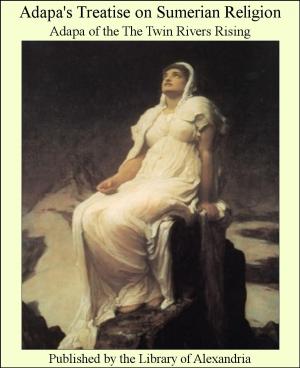| Author: | Robert Smythe Hichens | ISBN: | 9781465551085 |
| Publisher: | Library of Alexandria | Publication: | March 8, 2015 |
| Imprint: | Language: | English |
| Author: | Robert Smythe Hichens |
| ISBN: | 9781465551085 |
| Publisher: | Library of Alexandria |
| Publication: | March 8, 2015 |
| Imprint: | |
| Language: | English |
Some men deliberately don a character in early youth as others don a mask before going to an opera ball. They select it not without some care, being guided in their choice by the opinion they have formed of the world's mind and manner of proceeding. In the privacy of the dressing-room, the candles being lighted and the mirror adjusted at the best angle for a view of self, they assume their character, and peacock to their reflection, meditating: Does it become me? Will it be generally liked? Will it advance me towards my heart's desire? Then they catch up their cloak, twist the mirror back to its usual position, puff out the candles, and steal forth into their career, shutting the door gently behind them. And, perhaps till they are laid out in the grave, the last four walls enclosing them, only the dressing-room could tell their secret. And it has no voice to speak. For, if they are wise, they do not keep a valet. At the age of sixteen Eustace Lane chose his mask, lit the candles, tried it on, and resolved to wear it at the great masquerade. He was an Eton boy at the time. One fourth of June he was out in the playing-fields, paying polite attentions to another fellow's sister, when he overheard a fragment of a conversation that was taking place between his mother and one of the masters. His mother was a kind Englishwoman, who was very short-sighted, and always did her duty. The master was a fool, but as he was tall, handsome, and extremely good-natured, Eustace Lane and most people considered him to be highly intelligent. Eustace caught the sound of his name pronounced. The fond mother, in the course of discreet conversation, had proceeded from the state of the weather to the state of her boy's soul, taking, with the ease of the mediocre, the one step between the sublime and the ridiculous. She had told the master the state of the weather—which, for once, was sublime; she wanted him, in return, to tell her the state of her boy's soul—which was ridiculous. Eustace forgot the other fellow's sister, her limpid eyes, her open-worked stockings, her panoply of chiffons and of charms. He had heard his own name. Bang went the door on the rest of the world, shutting out even feminine humanity. Self-consciousness held him listening. His mother said: "Dear Eustace! What do you think of him, Mr. Bembridge? Is he really clever? His father and I consider him unusually intelligent for his age—so advanced in mind. He judges for himself, you know. He always did, even as a baby. I remember when he was quite a tiny mite I could always trust to his perceptions. In my choice of nurses I was invariably guided by him. If he screamed at them I felt that there was something wrong, and dismissed them—of course with a character. If he smiled at them, I knew I could have confidence in their virtue. How strange these things are! What is it in us that screams at evil and smiles at good
Some men deliberately don a character in early youth as others don a mask before going to an opera ball. They select it not without some care, being guided in their choice by the opinion they have formed of the world's mind and manner of proceeding. In the privacy of the dressing-room, the candles being lighted and the mirror adjusted at the best angle for a view of self, they assume their character, and peacock to their reflection, meditating: Does it become me? Will it be generally liked? Will it advance me towards my heart's desire? Then they catch up their cloak, twist the mirror back to its usual position, puff out the candles, and steal forth into their career, shutting the door gently behind them. And, perhaps till they are laid out in the grave, the last four walls enclosing them, only the dressing-room could tell their secret. And it has no voice to speak. For, if they are wise, they do not keep a valet. At the age of sixteen Eustace Lane chose his mask, lit the candles, tried it on, and resolved to wear it at the great masquerade. He was an Eton boy at the time. One fourth of June he was out in the playing-fields, paying polite attentions to another fellow's sister, when he overheard a fragment of a conversation that was taking place between his mother and one of the masters. His mother was a kind Englishwoman, who was very short-sighted, and always did her duty. The master was a fool, but as he was tall, handsome, and extremely good-natured, Eustace Lane and most people considered him to be highly intelligent. Eustace caught the sound of his name pronounced. The fond mother, in the course of discreet conversation, had proceeded from the state of the weather to the state of her boy's soul, taking, with the ease of the mediocre, the one step between the sublime and the ridiculous. She had told the master the state of the weather—which, for once, was sublime; she wanted him, in return, to tell her the state of her boy's soul—which was ridiculous. Eustace forgot the other fellow's sister, her limpid eyes, her open-worked stockings, her panoply of chiffons and of charms. He had heard his own name. Bang went the door on the rest of the world, shutting out even feminine humanity. Self-consciousness held him listening. His mother said: "Dear Eustace! What do you think of him, Mr. Bembridge? Is he really clever? His father and I consider him unusually intelligent for his age—so advanced in mind. He judges for himself, you know. He always did, even as a baby. I remember when he was quite a tiny mite I could always trust to his perceptions. In my choice of nurses I was invariably guided by him. If he screamed at them I felt that there was something wrong, and dismissed them—of course with a character. If he smiled at them, I knew I could have confidence in their virtue. How strange these things are! What is it in us that screams at evil and smiles at good















